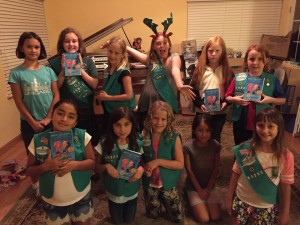Last month I began partnering with the Girl Scouts of Northern California by presenting my Girls Friendship without the Drama Workshops. In the first hour I teach girls to navigate all kinds of sticky peer conflicts while the moms (and the few cool dads who’ve shown up) sit back, listen and observe. During the second hour the girls skedaddle into another room where they engage in more (supervised) friendship-building skills while the parents and I circle the wagons and get to the heart of what girls need from those of us who love them.
To date I’ve done nine of these workshops with another seven scheduled. Girls can’t wait to start using what they’ve learned. Moms are reminded how painful it can be feel “replaced” by a friend. Dads are stunned at how hard it is for girls to tell a friend, “Stop. I don’t like that.” Parents are thrilled to have new insight, language, and context to help their daughters do a better job navigating friendships.
Here are some tips to help you help your daughters and sons resolve the inevitable issues that come up between our kids and their peers.
Dealing with Friendship Challenges
- Calm Down. No matter what awful thing some child has done to your daughter or son, calming down first makes it easier to get through the upset. So take some slow deep breaths and encourage your child to do the same.
- Show that you get it. Acknowledge that it hurts when a friend turns against you. Reflect back what you hear, “You sound really hurt, angry, and confused.” Share one of your own “hurt by a friend” stories. Share what you learned and how you used it to become a more thoughtful person and a better friend. This models empathy and reassures your child that (s)he will survive.
- What Can/Can’t You Control? Tell your child, “You can’t control a friend’s behavior or feelings, but you can get a handle on your own.” When we try to control things we can’t control, it stresses us out and makes us feel powerless. Don’t let your kid go there!
- You’ve got options! Even after a blow-up with a bff, your child is far from powerless. She always has options. For example, your child might:
- Never talk to that friend again
- Get back at her by spreading gossip
- Suppress the hurt and act like it didn’t bother you
- Find new friends
Brainstorming should be open-ended. Encourage your child to freely explore ideas without your judging them. They’re just ideas and this is a clearing process. Even the worst, knee-jerk options offer great (and totally safe) learning opportunities. In addition, you’ll give your child a gift by talking about all of this. When s/he doesn’t have to worry about your rushing in to “fix” the problem, your child’s thinking process will be accelerated. Hopefully, she’ll move closer to the time when she no longer accepts disrespectful behavior from anyone, including herself!
At the end of the process your child may decide to take a vacation from the drama or to find the EXIT out of the friendship. That’s her choice. But just because she’s finished, doesn’t mean she has the right to make life unhappy for an ex-friend. I put it is this way: You have the right to choose your friends, but it’s NEVER okay to be cruel or disrespectful. Keep your distance if you choose, but always treat others the way you want to be treated. Old rule. Still applies.












